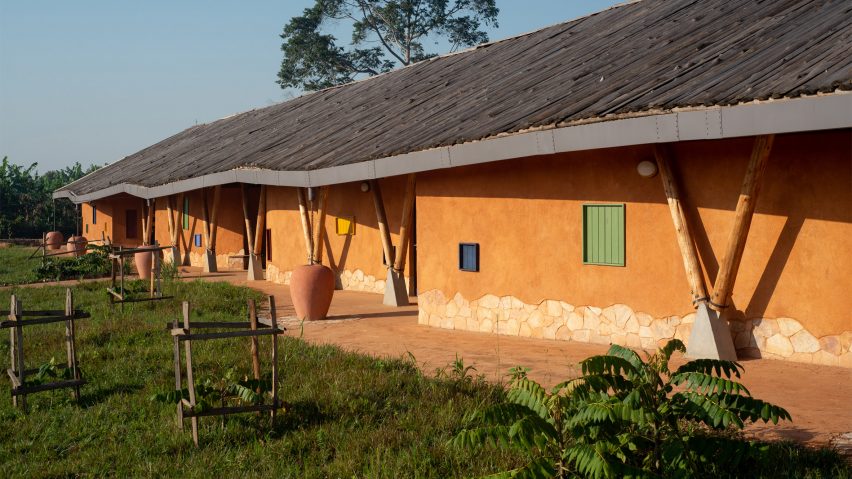Dezeen has revealed the winners of this year's Dezeen Awards sustainability categories including Localworks, Multitude of Sins and Kenoteq.
Localworks won for its school with curved walls built from earthbags, Multitude of Sins for its restaurant interior made from city-wide waste donations and Kenoteq for its brick made from construction waste.
Entries were initially scored by our jury of eight leading sustainability industry professionals before the winners were decided by a master jury that met at One Hundred Shoreditch in September made up of sustainable design and author Babette Porcelijn, Dodds & Shute co-founder Nick Shute and co-founder of Cornish design company Green&Blue Gavin Christman.
The Dezeen Awards 2022 sustainability categories are sponsored by Google and Dodds & Shute.
Find out more about the winning sustainability projects on the Dezeen Awards website or read on below:
Sustainable building of the year: Mustardseed by Localworks
Kampala-based Localworks constructed the Mustardseed Junior School in Uganda entirely from local resources. The building houses both a kindergarten and a primary school for local children.
The 1,146-square-metre building features walls built from earthbags filled with soil and external walls finished with an unpainted lime-earth render.
"Mustardseed is a considered, creative and inspiring kindergarten and primary school set within a biodiverse landscape, the perfect environment for children to learn about the importance of ecology and sustainable building," said the sustainability master jury.
"It demonstrates that innovation doesn't need to be driven by technology; we need sensible solutions that adopt slow thinking and responsible design," they continued. "The world needs more projects like this."
Read more about Mustardseed by Localworks ›
Highly commended: Learning and Sports Center by General Architecture Collaborative
General Architecture Collaborative constructed the community centre in collaboration with residents of Masoro Village in Rwanda using local materials.
The Learning and Sports Center was organised across a grid system, creating a series of small courtyards featuring brick-paved streets.
"Designed, built and operated by community members of a small rural farming village, this project goes beyond simply being a community hall," said the judges. "More than just bricks and mortar, it succeeds by creating a sustainable building rooted in social sustainability, empowering the local community through knowledge transfer in multiple ways."
Read more about Learning and Sports Center by General Architecture Collaborative ›
Sustainable interior of the year: The Circus Canteen by Multitude of Sins
Local studio Multitude of Sins designed a restaurant interior in Bangalore made of almost all reclaimed materials. The studio aimed to create a dining interior with a minimal carbon footprint.
The restaurant features a series of scrap metal archways as well as a booth made out of mismatched salvaged objects.
"The Circus Canteen is a bottom-up, democratic way to design from scratch that references the street and its culture in its design language in an uplifting and fun way," said the judges.
"So often sustainability is a heavy topic and this shows that it can be creative," they continued. "The world needs a bit more bonkers!"
Read more about The Circus Canteen by Multitude of Sins ›
Sustainable design of the year: K-Briq by Kenoteq
K-Briq is a sustainable building brick that is made mainly from construction waste. The brick was launched by Scottish startup Kenoteq and generates less than a tenth of the carbon emissions in its manufacture than regular brick.
The design by Kenoteq offers better insulation properties than a standard clay brick and can be produced in any colour.
"K-Briq is an opportunity to have an impact at scale, a thorn in the side of an industry that is largely static and crying out for disruptors," said the sustainability master jury.
Read more about K-Briq by Kenoteq ›

